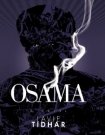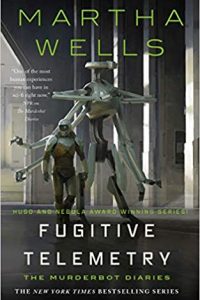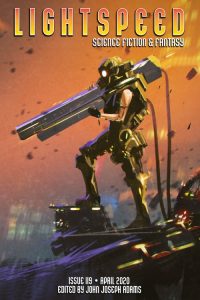A Dozen of the Best from 2011
by Jeff VanderMeer
In 2011, “the field” continued to shift and fragment and in the process proved itself to be exciting, deep, and passionately engaged with the world around it. The mammals are partying with the dinosaurs until late into the night, and the result is a wonderful diversity of approaches.
Novels bubbling up just under my top picks include Hannu Rajaniemi’s The Quantum Thief, Jesse Bullington’s The Enterprise of Death, Lev Grossman’s The Magician King, Stina Leicht’s Of Blood and Honey, Minister Faust’s The Alchemists of Kush, N.K. Jemisin’s The Kingdom of Gods, Kris Saknussemm’s Enigmatic Pilot, Nick Mamatas’s Sensation and Carolyn Ives Gilman’s Isles of the Forsaken. I encourage readers to seek out all of these novels—and to suggest their own best reads.
In the area of regrets, I have not yet read Christopher Priest’s much-praised The Islanders or Catherynne M. Valente’s The Folded World, but I am looking forward to both. Many people have also urged me to read Stephen King’s time-travel novel 11/22/63. Two amazing reads — Lauren Beukes’ Zoo City and Graham Joyce’s The Silent Land — are left off my list because even though I encountered them in their 2011 North American editions, they were both originally published in the UK in 2010. I read a bit more than half of Haruki Murakami’s 1Q84 and found myself loving it and being bored at the same time. I never finished it, and therefore had no chance to reconcile these two competing reactions.
My top picks from 2011 are listed by author rather than any ranking system.
 The Great Lover by Michael Cisco (Chômu Press) – After having written the best 2010 work of the weird, The Narrator, Michael Cisco has followed up that achievement with an idiosyncratic novel that requires the reader to acclimate to its unique rhythms and pacing. The Great Lover of the title is a sewerman and undead hero. The novel, to some measure, follows his strange adventures. Cisco effortlessly evokes both the grotesque and the sublime, providing scenes and situations that are often unique within weird fiction—or, for that matter, in fiction generally. To some degree, Cisco is operating in a sphere that most fiction writers never reach, or attain only rarely, and is doing it seemingly without effort. That he remains so unknown is an absolute travesty.
The Great Lover by Michael Cisco (Chômu Press) – After having written the best 2010 work of the weird, The Narrator, Michael Cisco has followed up that achievement with an idiosyncratic novel that requires the reader to acclimate to its unique rhythms and pacing. The Great Lover of the title is a sewerman and undead hero. The novel, to some measure, follows his strange adventures. Cisco effortlessly evokes both the grotesque and the sublime, providing scenes and situations that are often unique within weird fiction—or, for that matter, in fiction generally. To some degree, Cisco is operating in a sphere that most fiction writers never reach, or attain only rarely, and is doing it seemingly without effort. That he remains so unknown is an absolute travesty.
 The Sacred Band by David Anthony Durham (Doubleday) –Durham’s The Sacred Band is a very satisfying conclusion to the Acacia Trilogy begun with Acacia and The Other Lands. The series broke with the tradition of photocopying photocopies of European feudal society to create heroic fantasy and also ignored the current trend of “dirty realism” in this subgenre. The novel effectively shows the interplay and conflict between multiple races across complex situations in several countries. And while The Sacred Band examines the uses and abuses of power, it doesn’t skimp on strange magic, either. Some of the scenes in which Queen Corrin Akaran wields her power are “classic eldritch” in the best sense of iconic strange swords-and-sorcery. Themes and subplots begun in the earlier novels come together perfectly and yet not in pat ways. Explorations of odd cities, epic wars, mid-air battles between magical creatures, and a sea serpent erupting from the waves are just a few of the pleasures of this beautifully written and smartly realized novel.
The Sacred Band by David Anthony Durham (Doubleday) –Durham’s The Sacred Band is a very satisfying conclusion to the Acacia Trilogy begun with Acacia and The Other Lands. The series broke with the tradition of photocopying photocopies of European feudal society to create heroic fantasy and also ignored the current trend of “dirty realism” in this subgenre. The novel effectively shows the interplay and conflict between multiple races across complex situations in several countries. And while The Sacred Band examines the uses and abuses of power, it doesn’t skimp on strange magic, either. Some of the scenes in which Queen Corrin Akaran wields her power are “classic eldritch” in the best sense of iconic strange swords-and-sorcery. Themes and subplots begun in the earlier novels come together perfectly and yet not in pat ways. Explorations of odd cities, epic wars, mid-air battles between magical creatures, and a sea serpent erupting from the waves are just a few of the pleasures of this beautifully written and smartly realized novel.
 God’s War by Kameron Hurley (Night Shade Books) – In this first book of a continuing series, Hurley created a unique science fictional world settled by Moslems that featured bug-based tech/magic along with a centuries-old war. It’s a kaleidoscope of action, conflict, and intrigue driven by former assassin Nyx, a strong female character. Although at times the novel is almost too dizzying, it succeeds due to Hurley’s investment in Nyx and in her assistant, a magician named Rhys, along with the fascinating insect-based tech and unique cultural underpinnings. Hurley’s muscular prose style, the effective evocation of the world’s desolation, and the rough energy behind the writing made God’s War one of the most interesting SF reads of the year.
God’s War by Kameron Hurley (Night Shade Books) – In this first book of a continuing series, Hurley created a unique science fictional world settled by Moslems that featured bug-based tech/magic along with a centuries-old war. It’s a kaleidoscope of action, conflict, and intrigue driven by former assassin Nyx, a strong female character. Although at times the novel is almost too dizzying, it succeeds due to Hurley’s investment in Nyx and in her assistant, a magician named Rhys, along with the fascinating insect-based tech and unique cultural underpinnings. Hurley’s muscular prose style, the effective evocation of the world’s desolation, and the rough energy behind the writing made God’s War one of the most interesting SF reads of the year.
 Tattoo by Kirsten Imani Kasai (Del Rey) – This second book in the series begun with Ice Song raises the stakes considerably: the writing is stronger, more varied in its effects, the situations thought-provoking and sometimes disturbing, while her characters continue to be highly individual and interesting. In Kasai’s environmentally fragile world, human and animal genes combine and the rarest mutation of all–the Trader–can instantly switch genders. After having defeated mad Matuk the Collector in the first book, the protagonist, Sorykah finds that the Collector’s death has unleashed even darker forces, the consequences explored in Tattoo. As far as I can tell, this novel is the most underrated of 2011, not receiving nearly enough attention. Comparisons to Ursula K. Le Guin, Tanith Lee, and Angela Carter are well-deserved, given the kinetic energy of Kasai’s style and her unique imagination.
Tattoo by Kirsten Imani Kasai (Del Rey) – This second book in the series begun with Ice Song raises the stakes considerably: the writing is stronger, more varied in its effects, the situations thought-provoking and sometimes disturbing, while her characters continue to be highly individual and interesting. In Kasai’s environmentally fragile world, human and animal genes combine and the rarest mutation of all–the Trader–can instantly switch genders. After having defeated mad Matuk the Collector in the first book, the protagonist, Sorykah finds that the Collector’s death has unleashed even darker forces, the consequences explored in Tattoo. As far as I can tell, this novel is the most underrated of 2011, not receiving nearly enough attention. Comparisons to Ursula K. Le Guin, Tanith Lee, and Angela Carter are well-deserved, given the kinetic energy of Kasai’s style and her unique imagination.
 A Dance with Dragons by George R.R. Martin (Bantam) – The fifth book in the hugely popular Song of Ice and Fire fantasy series may never have been able to live up to some fans’ expectations…but underneath the weight of those desires lives and breathes a truly strange candidate for bestseller status: a huge, dense novel that devotes several scenes to bizarre and beautifully imaginative set-pieces on haunted rivers and in the supernatural North. A stalled military campaign stuck in the dead of winter is also evocative and harrowing. The approach Martin became known for in heroic fantasy—no character is safe from suddenly being run over by the wheels of fate or circumstance—may seem less shocking now given the rise of “gritpunk” epic fantasy, but is still effective. Scenes from the point of view of a certain famous dwarf are perhaps the baggiest in the novel, straining at times for sardonic effect. But A Dance with Dragons is still a stunning achievement, and should not be lumped in with more generic heroic fantasy series.
A Dance with Dragons by George R.R. Martin (Bantam) – The fifth book in the hugely popular Song of Ice and Fire fantasy series may never have been able to live up to some fans’ expectations…but underneath the weight of those desires lives and breathes a truly strange candidate for bestseller status: a huge, dense novel that devotes several scenes to bizarre and beautifully imaginative set-pieces on haunted rivers and in the supernatural North. A stalled military campaign stuck in the dead of winter is also evocative and harrowing. The approach Martin became known for in heroic fantasy—no character is safe from suddenly being run over by the wheels of fate or circumstance—may seem less shocking now given the rise of “gritpunk” epic fantasy, but is still effective. Scenes from the point of view of a certain famous dwarf are perhaps the baggiest in the novel, straining at times for sardonic effect. But A Dance with Dragons is still a stunning achievement, and should not be lumped in with more generic heroic fantasy series.
 Embassytown by China Miéville (Del Rey) – In reading an innovative novel like Embassytown, it soon becomes clear that contemporary science fiction considered as a “literature of ideas” separate from a “literature of entertainment” may need to raise its game. This tale of alien contact and the repercussions of the uses of language brings to mind the best of 1970s-era fiction from Le Guin and Lessing. Set on another planet and detailing the conflict between humans and the native civilization, the novel is by no means perfect—ironically, the sections of conventional action are poorly paced and repetitive—but when content to dwell in realms of the meditative, philosophical, and descriptive, the novel has a power and effect that lingers in the mind long after reading. It’s a brutal rhapsody on words and communication.
Embassytown by China Miéville (Del Rey) – In reading an innovative novel like Embassytown, it soon becomes clear that contemporary science fiction considered as a “literature of ideas” separate from a “literature of entertainment” may need to raise its game. This tale of alien contact and the repercussions of the uses of language brings to mind the best of 1970s-era fiction from Le Guin and Lessing. Set on another planet and detailing the conflict between humans and the native civilization, the novel is by no means perfect—ironically, the sections of conventional action are poorly paced and repetitive—but when content to dwell in realms of the meditative, philosophical, and descriptive, the novel has a power and effect that lingers in the mind long after reading. It’s a brutal rhapsody on words and communication.
 Mr. Fox by Helen Oyeyemi (Riverhead) – Oyeyemi’s fourth novel is an intricate, many-tangled creation that uses a welter of related stories to describe an affair between a writer and his muse. Oyeyemi freely mixes folktales and metafictional elements to examine love, disguises, and the nature of stories. You can get lost in the novel, only to reappear in a more familiar part of the maze. Overall, Mr. Fox reads like a mutant hybrid of the work of the Brontes, Witold Gombrowicz, Barbara Comyns, and Kelly Link. One of the best of the next generation of writers working in the interstices of realism and the fantastical, Oyeyemi continues to write thought-provoking, emotive, and unclassifiable fiction.
Mr. Fox by Helen Oyeyemi (Riverhead) – Oyeyemi’s fourth novel is an intricate, many-tangled creation that uses a welter of related stories to describe an affair between a writer and his muse. Oyeyemi freely mixes folktales and metafictional elements to examine love, disguises, and the nature of stories. You can get lost in the novel, only to reappear in a more familiar part of the maze. Overall, Mr. Fox reads like a mutant hybrid of the work of the Brontes, Witold Gombrowicz, Barbara Comyns, and Kelly Link. One of the best of the next generation of writers working in the interstices of realism and the fantastical, Oyeyemi continues to write thought-provoking, emotive, and unclassifiable fiction.
 Dancing with Bears by Michael Swanwick (Night Shade Books) – In this daring post-utopian novel complete with dangerously weird robots, con-men Darger and Surplus are on their way to Russia, having quite “innocently” acquired a caravan delivering a priceless gift from the Caliph of Baghdad to the Duke of Muscovy. Once they reach Moscow, an absurd level of intrigue, revolution, and double-crossing occurs. Fritz Leiber set a high bar indeed for loveable rogues with his Fafhrd and the Grey Mouser series. It’s such a high bar that I find most riffs on this kind of thing tiresome and not at all witty. But Michael Swanwick has, in Dancing with Bears, provided readers with two of the narstiest and most entertaining such rogues in recent memory.
Dancing with Bears by Michael Swanwick (Night Shade Books) – In this daring post-utopian novel complete with dangerously weird robots, con-men Darger and Surplus are on their way to Russia, having quite “innocently” acquired a caravan delivering a priceless gift from the Caliph of Baghdad to the Duke of Muscovy. Once they reach Moscow, an absurd level of intrigue, revolution, and double-crossing occurs. Fritz Leiber set a high bar indeed for loveable rogues with his Fafhrd and the Grey Mouser series. It’s such a high bar that I find most riffs on this kind of thing tiresome and not at all witty. But Michael Swanwick has, in Dancing with Bears, provided readers with two of the narstiest and most entertaining such rogues in recent memory.
 Osama by Lavie Tidhar (PS Publishing) – Subtle, forceful, and beautifully written, this nuanced and fascinating novel is at heart a compelling alt-world mystery. In a milieu without global terrorism, Joe, a private detective, is hired by a mysterious woman to find a man: the obscure author of pulp fiction novels featuring one Osama Bin Laden. The short chapters that comprise Osama waste few words while still featuring some beautiful writing. The word “haunting” is over-used as a descriptor, but it fits here: the novel haunts, it echoes, and it ghosts in a hypnotic, slipstreamy, and evocative way. Tidhar’s progress as a writer has been swift and he’s rapidly becoming one of the field’s best and most flexible stylists.
Osama by Lavie Tidhar (PS Publishing) – Subtle, forceful, and beautifully written, this nuanced and fascinating novel is at heart a compelling alt-world mystery. In a milieu without global terrorism, Joe, a private detective, is hired by a mysterious woman to find a man: the obscure author of pulp fiction novels featuring one Osama Bin Laden. The short chapters that comprise Osama waste few words while still featuring some beautiful writing. The word “haunting” is over-used as a descriptor, but it fits here: the novel haunts, it echoes, and it ghosts in a hypnotic, slipstreamy, and evocative way. Tidhar’s progress as a writer has been swift and he’s rapidly becoming one of the field’s best and most flexible stylists.
 Mechanique: A Tale of the Circus Tresaulti by Genevieve Valentine (Prime Books) – In this first novel from a talented short story writer, the traveling Circus Tresaulti survives despite the threats posed by a vaguely defined post-apocalyptic milieu. The plot of the novel is firmly focused on the emotional lives of the circus performers and the tangled knot of their relationships. The circus is figuratively haunted by Bird, an aerialist who fell to his death. Valentine displays an extraordinary ability to weave the effects of that act into the foundation of Mechanique. In a sense, the novel is composed of a series of brief set-pieces about the characters that interlock to form a greater whole.
Mechanique: A Tale of the Circus Tresaulti by Genevieve Valentine (Prime Books) – In this first novel from a talented short story writer, the traveling Circus Tresaulti survives despite the threats posed by a vaguely defined post-apocalyptic milieu. The plot of the novel is firmly focused on the emotional lives of the circus performers and the tangled knot of their relationships. The circus is figuratively haunted by Bird, an aerialist who fell to his death. Valentine displays an extraordinary ability to weave the effects of that act into the foundation of Mechanique. In a sense, the novel is composed of a series of brief set-pieces about the characters that interlock to form a greater whole.
 Among Others by Jo Walton (Tor Books) – This coming-of-age novel takes the form of diary entries from fifteen-year-old Morwenna Phelps as she deals with the aftermath of traumatic magical events involving her eldritch mother and even stranger faerie. That Morwenna is voraciously reading science fiction and fantasy throughout Among Others adds to its delights. Things Happen, of course, and there’s useful ambiguity, to some extent, about the fantastical element, but as I wrote in a column for the New York Times Book Review, “The real key to appreciating the novel can be found in [this] passage: ‘Tolkien understood about the things that happen after the end. Because this is all Scouring of the Shire, this is figuring out how to live in the time that wasn’t supposed to happen after the glorious last stand.’ It’s a terribly brave act, to write a novel that is in essence aftermath, but Walton succeeds brilliantly. The novel’s a wonder and a joy.”
Among Others by Jo Walton (Tor Books) – This coming-of-age novel takes the form of diary entries from fifteen-year-old Morwenna Phelps as she deals with the aftermath of traumatic magical events involving her eldritch mother and even stranger faerie. That Morwenna is voraciously reading science fiction and fantasy throughout Among Others adds to its delights. Things Happen, of course, and there’s useful ambiguity, to some extent, about the fantastical element, but as I wrote in a column for the New York Times Book Review, “The real key to appreciating the novel can be found in [this] passage: ‘Tolkien understood about the things that happen after the end. Because this is all Scouring of the Shire, this is figuring out how to live in the time that wasn’t supposed to happen after the glorious last stand.’ It’s a terribly brave act, to write a novel that is in essence aftermath, but Walton succeeds brilliantly. The novel’s a wonder and a joy.”
 Zone One by Colson Whitehead (Doubleday) – Whitehead knows his zombies, and in Zone One this amazing writer produced a near-perfect zombie epic. The novel is set mostly in a Manhattan after civilization is trying to rise again by clearing the iconic island of the undead. Whitehead’s protagonist, whose name is given as Mark Spitz, is part of a zombie-clearing team, and through the course of three days the reader comes to know his back-story in intimate detail while also being treated to scary and darkly humorous zombie encounters in the present-day of the novel. It is a tour-de-force for Whitehead to be able to so completely flesh out his main character while jumping back and forth in time, and to at the same time trump many another novel and movie by providing brilliant zombie set-pieces that should satisfy any aficionado of the subgenre. Zone One is sad, funny, and scary, both action-packed and melancholy. It is also the best-written novel I encountered in 2011.
Zone One by Colson Whitehead (Doubleday) – Whitehead knows his zombies, and in Zone One this amazing writer produced a near-perfect zombie epic. The novel is set mostly in a Manhattan after civilization is trying to rise again by clearing the iconic island of the undead. Whitehead’s protagonist, whose name is given as Mark Spitz, is part of a zombie-clearing team, and through the course of three days the reader comes to know his back-story in intimate detail while also being treated to scary and darkly humorous zombie encounters in the present-day of the novel. It is a tour-de-force for Whitehead to be able to so completely flesh out his main character while jumping back and forth in time, and to at the same time trump many another novel and movie by providing brilliant zombie set-pieces that should satisfy any aficionado of the subgenre. Zone One is sad, funny, and scary, both action-packed and melancholy. It is also the best-written novel I encountered in 2011.






I’ve been looking forward to your list for a while — the past few have guided my reading in previous years, helping narrow down the always too large list of “regrets” to the books I really don’t want to miss. Guess I have a Swanwick novel to read — it is coming to audio late this month, which makes it more likely, sooner. I still haven’t read God’s War or Tattoo, but I keep hearing good things about both, particularly God’s War appearing on more and more year-end’s best lists.
Of the 2011 novels not among the 24 mentioned here, I really enjoyed Sensation by Nick Mamatas (PM Press) and while I wasn’t sure at first, in the rear-view Murakami’s 1Q84 has been growing on me. Adding to your own list of “regrets” for me it is finding time to finish JM McDermott’s Never Knew Another.
Did not see the Brontes in Mr. Fox! Might have to think about that one.
Still, when I’ve been reflecting on the question “what is the best 2011 novel you’ve read?” this winter, I keep coming back to David Halperin’s Journal of a UFO Investigator (Viking). Like Walton’s glimmering Among Others, it’s a coming of age novel with some ambiguity about it’s speculative nature — or not.
Reprinted from the 90’s, but the best thing I read last year was “Brand New Cherry Flavor” by Todd Grimson. Perverse, weird, literary, full of magic.
Another one I am curious about is Mat Johnson’s Pym.
Oh crap. The Mamatas should definitely be on the “bubbling list”. Will have it added.
Pingback:SF Tidbits for 2/6/12 - SF Signal – A Speculative Fiction Blog
Pingback:VanderMeer | Galileo Online
I think you’ll like Enterprise of Death very much. It’s one of my new all-time favourite books, profane, profound, dark, grotesque, warm and funny and very human. Also loved Osama, which is unnerving and dreamy, God’s War for being raucously violent fun with subversive smarts, and Embassytown is classic smart, twisty ingenious Mieville at his best.
Pingback:Jeff VanderMeer Names His Dozen of the Best From 2011 at Night Shade Books
Pingback:the firebird
Pingback:Weekly List Bookmarks (weekly) | Eccentric Eclectica @ ToddSuomela.com